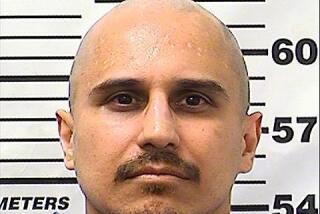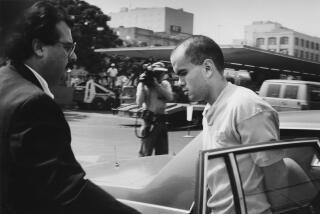Cold-case inquiry leads to professor
One day late last year Norma Patricia Esparza, a respected professor of psychology in Geneva, got on a plane bound for an academic meeting in St. Louis.
When the plane landed in Boston for a layover, police met her at the airport and arrested her -- for an 18-year-old slaying in Santa Ana.
Esparza, 39, and three others are now facing trial in a homicide that has generated international attention.
Prosecutors say that on a night in the spring of 1995, when she was a sophomore at Pomona College, Esparza went to a Santa Ana bar with a group and pointed out a man she said had raped her in her college dormitory. Hours later, the man’s body was found dumped alongside a road in Irvine. He had been beaten and hacked with a meat cleaver.
Esparza says she was forced by an aggressive ex-boyfriend to identify her rapist and then conceal his crime for nearly two decades.
Prosecutors say Esparza conspired to commit the killing, though she did not actually carry it out. According to court records, she has changed some details of her story since the arrest.
Esparza is now charged with one felony count of special circumstances murder during the commission of a kidnapping. She says prosecutors are pressuring her to plead guilty to voluntary manslaughter. No trial date has been set, but a hearing has been scheduled for Thursday. She is free on $300,000 bail.
Her ex-boyfriend Gianni Anthony Van and two others, Shannon Gries and Diane Tran, were also charged. All three have pleaded not guilty. A fourth suspect, Kody Tran, died in a shootout with police last year.
On Wednesday, Esparza stood with her husband outside a courthouse in Santa Ana to tell her side of the story. Her 4-year-old daughter clung to her waist as she spoke. She said she was a victim, not only of rape, but of sexual abuse since she was a child.
“We’re not polished, we’re not professional. We’re just a family trying to tell our story,” said her husband Jorge R. Mancillas, a neurobiologist who works on global health issues in Geneva.
Behind her stood three women from the organization End Rape on Campus, which seeks to hold colleges and universities accountable for their handling of sexual misconduct.
“Her story rings very true,” said Caroline Heldman, a co-founder of the organization. “Her behavior and reaction to the threat is very consistent with victims of rape.”
Prosecutors responded that the evidence in the trial would show that Esparza played a role in the slaying.
“I know she wants to try this case in the media,” said Susan Kang Schroeder, chief of staff for the district attorney. “We look forward to trying this case in court.”
Until her arrest, Esparza’s story had seemed a slice of the American dream.
An immigrant who came to Santa Ana from Mexico as a small child, her life forever changed when she obtained a scholarship to attend the elite Phillips Exeter Academy in New Hampshire and then Pomona College.
When she was home in Santa Ana from college for the weekend in March 1995, she decided to go to the El Cortez nightclub, where she met a man named Gonzalo Ramirez, according to court records. They hit it off and the next morning he asked her to breakfast along with her sister and a friend from school. After breakfast he offered to drive Esparza and her friend back to her college in Claremont.
When they were in her dorm room, he raped her, she said in court records and interviews. She went to a school nurse who gave her a pill to prevent pregnancy. But she didn’t report the rape to authorities and the nurse didn’t advise her to, she said in an interview with The Times.
“I don’t think I was thinking at that time,” she said. “I felt ashamed. I felt guilty. I didn’t want to come forward because I didn’t want my family to know.”
A few weeks later she said she told Van, her former boyfriend, about the rape. He was enraged, she said.
Esparza told investigators in December 2012 that she, Van and at least one friend went on two occasions to look for Ramirez at El Cortez, according to court records. When she testified before a grand jury a few months later, she said she remembered only going once -- on the night she picked Ramirez out.
She testified that Van was “insisting, yelling, telling me that I had to point out the rapist, point out the attacker. And at some point Gonzalo Ramirez walked by, and I cringed and I told Gianni that that was the person.”
She thought “the worst that would happen is that he would rough him up,” she told the grand jury.
“Many people say you’re so intelligent you have a PhD how did you not see that coming?” Esparza said in the Times interview. “The fact is there’s different types of intelligence. You can be intelligent and not be street-wise... not foreseeing the bad intentions in other people.”
Julie Ann Rojas, who was Gries’ girlfriend at the time, testified before the grand jury that she was with Esparza and others at El Cortez when they were looking for Ramirez. The group talked about hitting his car as he left the club so they could force him out and beat him up, Rojas said.
Prosecutors say Van, Gries and Kody Tran did just that after Ramirez left. When the victim got out of the truck, they attacked him and took him to a transmission shop owned by Tran.
Esparza and Rojas went to a bar and waited for about an hour, according to court records. Later they went to the shop. Esparza said she saw Ramirez tied and hanging from the ceiling.
Even after Ramirez was killed, she began dating Van again and later married him, court records show. She says she did so because she feared for her life and was told that if she married him she couldn’t be forced to testify against him.
She went on to graduate from Pomona College and to earn her doctorate. Nine years later she divorced Van and married Mancillas, her current husband.
She now lives in a small town in France on the Swiss border near Geneva where she is raising her daughter. She is an assistant professor of psychology and counseling at Webster University, Geneva. She worries that the life she has built there will soon be taken from her.
“It’s very peaceful. It’s very quiet,” she said. “It’s a very good place to be if you want to raise a daughter that doesn’t have to go out at night and fear for what kind of harm can come to her.”
--
More to Read
Sign up for Essential California
The most important California stories and recommendations in your inbox every morning.
You may occasionally receive promotional content from the Los Angeles Times.










